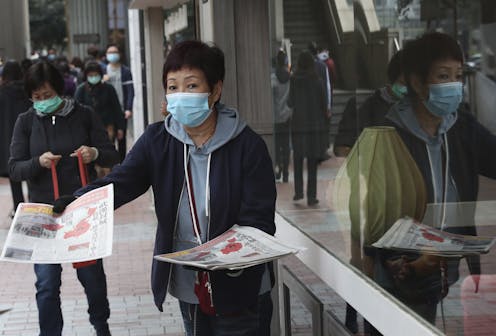As China suffers from coronavirus, some wonder: Is it really that serious? 3 questions answered
- Written by John A. Lednicky, Research Professor, Environmental and Global Health, University of Florida

Editor’s Note: The coronavirus outbreak continues to worsen in China, with 28,200 confirmed cases as of Feb. 6, 2020. The Chinese government has announced even stricter measures to stop the spread of the disease, including the rounding up of people in Wuhan[1], the city where the outbreak began, for mass quarantine. And the doctor who warned authorities about the disease[2] has died. Just how bad might this outbreak become? Virologist and public health expert John A. Lednicky explains.
1. Is this outbreak really that serious?
Epidemics are spreading more quickly and farther[3] in the 21st century than in previous centuries due to globalization and air travel. When outbreaks occur, there is a predictable pattern that can be summarized as: (a) There is a delay in recognizing that an outbreak is occurring; (b) a significant impact on trade and travel[4] typically occurs due to quarantine measures; (c) the public panics due to misinformation and fear of the unknown, and this can be exacerbated by media coverage.
This outbreak is serious to China, to millions of people there, to its economy and potentially to the world’s economy. China’s main concern is for its own citizens. It has experience controlling outbreaks of different types of influenza viruses, SARS coronavirus[5], and so on, and the resources to effectively deal with large outbreaks.
China’s government can exert stringent outbreak control measures, such as shutting down public transportation, and take unprecedented moves, such as imposing a citywide quarantine, which would not be easy to do in other countries. Because it is a wealthy country, China is also able to respond to large areas affected by an outbreak, whereas many countries would not be able to afford to do this.
Unlike country-specific responses to outbreaks, the World Health Organization[6] provides guidance on how to control outbreaks worldwide. Its stated primary purpose is to direct international health within the United Nations’ system and to lead partners in global health responses.
The WHO does not have the financial resources to cover all the expenses of a public health response to an epidemic or pandemic. It does provide a limited supply of materials needed for the performance of diagnostic tests to qualified laboratories. The major benefit to the world community is that the WHO releases information regarding the status and severity of an outbreak, and guidance on how to control the outbreak.
The manner in which individual countries respond to outbreaks, whether epidemic or pandemic, is less predictable, especially for those that lack the resources, infrastructure and trained personnel needed for an adequate response.
If the outbreaks are effectively controlled and people remain quarantined for the near-term, the major impacts to the people of China will revolve around issues related to loss of wages, and quality of life issues, such as obtaining sufficient food. If the outbreaks are not controlled, the consequences will be severe. Businesses and school systems will be adversely impacted, and public attitudes toward the government could lead to general discontent and civil disorder.
2. Have there been previous quarantines on this scale?
Small-scale quarantine has been practiced since ancient times[7], exemplified by the Israelites’ confinement of lepers to specific living areas, onto the present, such as some of the quarantine measures undertaken to control Ebola outbreaks[8]. The quarantine procedures being imposed in China in response to the new coronavirus are unprecedented in scale and complexity. They will be intensively analyzed by scientists and epidemiologists, and will inform the next generation of infection control practitioners.
3. Is there an end in sight?
It is too early to predict an end in sight. Many public health specialists are optimistic that the outbreak will burn out as a consequence of stringent infection control and quarantine practices. And as that happens, the hope is that the virus will be eradicated, as was the case for SARS coronavirus[9]. We also hope that the virus does not mutate to a form that is well-adapted to complete its life cycle in humans; that is, that it does not become a common human respiratory virus such as what is thought to have occurred with human coronavirus NL63[10], a virus that appears to have jumped species from bats to humans.
[ Expertise in your inbox. Sign up for The Conversation’s newsletter and get a digest of academic takes on today’s news, every day.[11] ]
References
- ^ including the rounding up of people in Wuhan (www.nytimes.com)
- ^ doctor who warned authorities about the disease (www.theguardian.com)
- ^ Epidemics are spreading more quickly and farther (www.who.int)
- ^ significant impact on trade and travel (doi.org)
- ^ influenza viruses, SARS coronavirus (www.nytimes.com)
- ^ World Health Organization (www.who.int)
- ^ ancient times (theconversation.com)
- ^ Ebola outbreaks (doi.org)
- ^ SARS coronavirus (emedicine.medscape.com)
- ^ human coronavirus NL63 (doi.org)
- ^ Expertise in your inbox. Sign up for The Conversation’s newsletter and get a digest of academic takes on today’s news, every day. (theconversation.com)
Authors: John A. Lednicky, Research Professor, Environmental and Global Health, University of Florida

